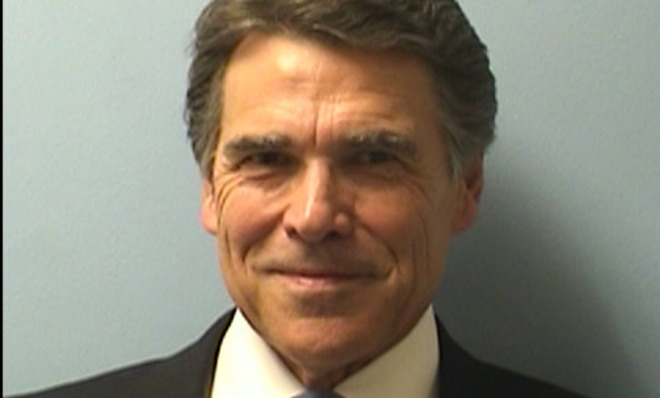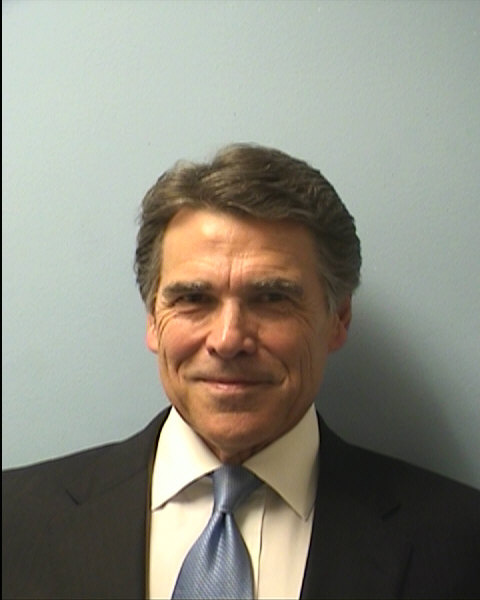The real lesson of Rick Perry's mug shot
We all know that in America, you're supposed to be innocent until proven guilty. But we don't act like it.


A free daily email with the biggest news stories of the day – and the best features from TheWeek.com
You are now subscribed
Your newsletter sign-up was successful
On Tuesday evening, the longest-serving governor in Texas history went to the Travis County courthouse in Austin and turned himself in to be booked on two abuse-of-power felony charges handed down by a grand jury last week. Within a span of about 10 minutes, Gov. Rick Perry (R) was fingerprinted and posed for his mug shot. You've probably already seen it, but Perry dressed for the occasion:

Perry turned his mug shot, and in fact his whole booking, into an act of defiance, on-point messaging, and deft political theater. In fact, Democratic National Committee spokesman Michael Czin, who called the scene at the Blackwell-Thurman Criminal Justice Center "theatrics" and a "sideshow" to the legal battle ahead, then tweeted this from his personal account:
I don't think he's being sarcastic. When the late Molly Ivins dubbed Perry "Governor Goodhair," it was only half in mockery. Perry isn't the first politician with a nice booking photo, or the only person who's turned his mug shot into an opportunity for self-promotion (see: this guy) or even adulation, but most people arrested in this country aren't so lucky.
The Week
Escape your echo chamber. Get the facts behind the news, plus analysis from multiple perspectives.

Sign up for The Week's Free Newsletters
From our morning news briefing to a weekly Good News Newsletter, get the best of The Week delivered directly to your inbox.
From our morning news briefing to a weekly Good News Newsletter, get the best of The Week delivered directly to your inbox.
There are businesses that make their money humiliating arrestees and titillating gawkers with mug shots of "celebrities, sports personalities, hardened criminals, and unusual looking people," as Mugshot.com advertises its services. They then charge people hundreds of dollars to remove their photos. And if sites like WhosArrested.com and BustedMugshots.com seem kind of seedy, many local newspapers offer a similar service — including Perry's hometown paper, the Austin American-Statesman.
But here's the thing: People in mug shots haven't been convicted of any crime. And yet, we tend to automatically assume the person in the shot is guilty. "A photo of an inebriated celebrity or a smiling John Edwards can bring a Pavlovian negative reaction to them in perpetuity," says David Goetzl at MediaPost.
A criminal record is usually understood as starting with a felony conviction, says Occidental College sociologist Danielle Dirks at The Society Pages. But "today the 'digital mark' of a criminal record created by the mug shot industry begins at the point of arrest," so "arrestees can be treated as criminals (and discriminated against as such) even in the absence of guilt or a criminal conviction."
Princeton's Naomi Sugie agrees that "online mug shots stigmatize individuals as criminal offenders, even if they are ultimately not charged or convicted of a crime." And this creates real-life problems, she continues:
A free daily email with the biggest news stories of the day – and the best features from TheWeek.com
Several studies have found that arrests have few negative consequences.... However, websites like Mugshots.com potentially alter the equation. The publicity of arrests through these online venues is stigmatizing and likely results in penalties across a variety of domains, such as finding work, applying for an apartment, and interacting with peers. Even though mug shots are not evidence of convictions, it is unlikely that potential employers, landlords, and peers will make the distinction. [Society Pages]
The Supreme Court has consistently ruled that mug shots are public records, but even as far back as 1966, notes Martin Austermuhle at The Washington Post, a federal appellate court found that when people view mug shots, "the inference that the person involved has a criminal record, or has at least been in trouble with the police, is natural, perhaps automatic."
Rick Perry will probably be fine. He has assembled a high-powered, very expensive legal team, and at least in the court of public opinion, he seems to be faring well. If a jury does convict him, he has a very good shot of having a Texas appellate judge overturn the conviction.
But guilty or not, his mug shot is out there forever. Yours might be, too, even if you did nothing wrong, even if the police acknowledge they made a mistake. If these mug shots have to be out there for the public to see, forever, let's at least remember what they aren't: Proof that the person smiling or scowling or just staring blankly at the camera is a criminal.
Peter has worked as a news and culture writer and editor at The Week since the site's launch in 2008. He covers politics, world affairs, religion and cultural currents. His journalism career began as a copy editor at a financial newswire and has included editorial positions at The New York Times Magazine, Facts on File, and Oregon State University.
-
 ‘Zero trimester’ influencers believe a healthy pregnancy is a choice
‘Zero trimester’ influencers believe a healthy pregnancy is a choiceThe Explainer Is prepping during the preconception period the answer for hopeful couples?
-
 AI surgical tools might be injuring patients
AI surgical tools might be injuring patientsUnder the Radar More than 1,300 AI-assisted medical devices have FDA approval
-
 9 products to jazz up your letters and cards
9 products to jazz up your letters and cardsThe Week Recommends Get the write stuff
